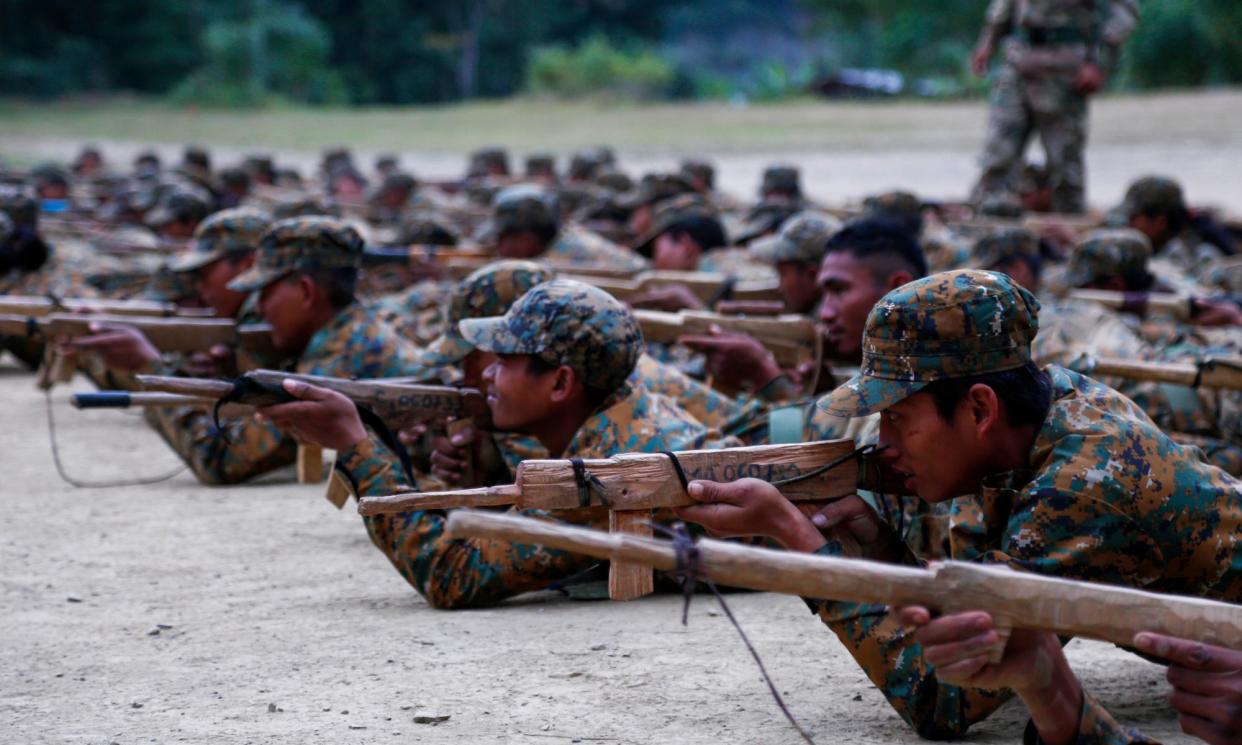Three years on from Myanmar’s military coup, the junta is struggling to assert control

Three years after seizing power, Myanmar’s junta is struggling to assert control, with humiliating losses in recent months and growing criticism of its leader, Min Aung Hlaing, by pro-military figures.
Images shared across social media show hauls of weapons seized from overrun military outposts in the north, exhausted soldiers surrendering en masse and even a military jet plunging from the sky after it was shot down. In one unprecedented image, brigadier general commanders are pictured raising a glass – apparently with their former enemies – after they were forced to concede defeat in the key town of Laukkai in northern Shan state, along with almost 2,400 men.
The UN says about two-thirds of the country remains gripped by conflict.
The junta has lost key territory in the north along the border with China, and in the west, near the Indian border. Elsewhere, where progress by anti-coup groups has been slower, the military remains stuck in fierce battles, unable to quash a persistent resistance movement.
On social media, pro-military commentators have voiced dissatisfaction at the leadership.
Earlier this month, an ultranationalist monk, Pauk Sayardaw, called for Min Aung Hlaing to resign at a protest in Pyin Oo Lwin, a town in Mandalay region that has a large military presence and is home to the elite Defence Services Academy, BBC Burmese reported.
‘China was intending to punish the junta’
Myanmar has been gripped by protracted conflict since 2021, when the military seized power in a coup, ousting the elected government of Aung San Suu Kyi. The coup, which enraged the public, prompted huge street protests calling for the return of democracy. When junta violence meant rallies were no longer safe, people took up arms to fight against military oppression, often equipped with little more than homemade weapons.
There are a multitude of different groups fighting against the junta – including newer, civilian pro-democracy groups that took up arms after the coup, which are known as people’s defence forces (PDFs). Many of these are aligned with the National Unity Government (NUG), which was set up to oppose the junta.
Some older, ethnic armed groups, which have long fought against the military for independence, are also fighting against the junta. While they all oppose the military, their specific goals, and the extent to which these groups are coordinatedvaries.
For a long time the conflict has been stuck in stalemate – with the military unable to control its opponents, and relying on airstrikes and scorched earth tactics to push back, with devastating consequences for civilians.
The conflict shifted on 27 October, however, with the launch of operations by several groups of experienced ethnic armed groups, known as the Brotherhood Alliance. The operation in coordination with newer anti-coup groups, aimed to seize territory from the junta in the north of the country.
The rapid success of the Brotherhood Alliance campaign prompted renewed offensives elsewhere in the country and gave a major morale boost to the pro-democracy resistance. Progress in other areas, including the south of the country, has been slower, and hopes that a domino effect could deliver a decisive blow to the military have since been tempered.
Analysts also caution that while the groups involved in the Brotherhood Alliance have identified as part of the wider pro-democracy movement, they have their own territorial ambitions.
Yun Sun, senior fellow and co-director of the east Asia Program at the Stimson Center, said China – frustrated with the junta over its failure to clamp down on booming scam operations that target Chinese nationals – had given tacit approval for the Brotherhood Alliance operation.
“China was intending to punish the junta,” says Sun. But it has since made it clear to such groups that it wants a return to stability, she adds.
‘Everyone wants to leave’
The NUG says 60% of the country is now controlled by opponents of the junta. But measuring who controls which areas of the country is difficult, due to the highly complex and fluid nature of the conflict.
“In many areas where PDFs or groups linked to the NUG are operating, they may be the main service providers … but they can’t prevent military incursions. Is that control?” says Morgan Michaels, research fellow for south-east Asian politics and foreign policy at the International Institute for Strategic Studies. “In many cases it’s mixed control and contestation, and that is fluid and changing over time.”
Ye Myo Hein, executive director of the Tagaung Institute of Political Studies (TIPS), and a global fellow with the Asia Program at the Woodrow Wilson International Center for Scholars, says that, regardless, the military faces unprecedented battlefield challenges.
“For the first time in history, the military now faces simultaneous attacks from armed resistance of various types, ranging from conventional warfare to guerrilla tactics and from overt to covert operations, in 12 out of Myanmar’s 14 states and regions,” he says.
There are reports that at senior levels there is growing frustration at the military leadership.
Despite this, Ye Myo Hein says it is highly unlikely that Min Aung Hlaing could be ousted as junta chief. “The military’s institutional culture, nurtured over seven decades, has established a feudal system with its top leader in the most powerful position,” he added.
Even if there were to be a change of leadership, some fear the alternative could be even more violent.
The troops fighting the junta’s war are demoralised and exhausted and the brutal campaigns it has launched across the country, in Bamar-majority heartland areas, have left it unable to recruit.
“Everyone wants to leave,” one recent defector told the Guardian. “Maybe soldiers would still love the military. But they don’t love the leaders any more.”


